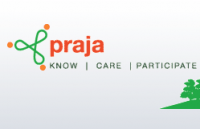
Praja collects input on which civic issues are most pressing and encourages citizens to help develop solutions to these issues.
Posted by Namita Singh on Nov 23, 2010

Praja collects input on which civic issues are most pressing and encourages citizens to help develop solutions to these issues.
Praja (“Citizens” or “Public”) is an Indian organization that describes itself as a “social networking site for people interested in local urban civic issues.” Its website collects citizens’ input on which issues are most pressing and encourages participants to help develop solutions to these issues. Then it brings these issues to the attention of government authorities and offline communication with public officials is posted online so citizens can see if progress is made.
Visitors can use Praja’s website as a tool to track discussions, proposals, specific tasks and events related to specific issues. The organization is also spearheading an open data project in Karnataka State. The project is still in the pilot phase, but the goal is to define and collect government datasets, make them available in open formats, and encourage citizen development of applications using this data.
My name is Pranav Jha and I am one of the founders of Praja. It all started with blogs I used to write on general urban civic issues. A group of like-minded people who followed them got together — Shastri from the UK, Vadiraj from the US and me in Bangalore, India — and decided to come up with Praja.in, which could be a place to “hang out” for civic-minded people. It can best be described as a “social networking site for people interested in local urban civic issues”.
We also extract information and data from the government via multiple tools, like via right-to-information requests, and publish it online, while blogging and encouraging discussion, creating awareness among citizens, getting their reactions and then communicating this back to the government. We even started an open data project with the Karnataka government.
The big vision is to be the preferred online destination for all civic-minded people to come and pursue whichever objective they are interested in. The idea is to get citizens themselves to talk, discuss and bring out issues, which are then passed on to the respective authorities in the government, along with suggestions for solutions, with a relentless follow-up process. It’s not to do a job that the government is supposed to do, but to make it accountable for its deficiencies with a constructive and suggestive approach.
With our open data project, the aim will be to bring out in the open all the information the public needs. Starting with one government department in Karnataka state, which has agreed to collaborate, we hope to eventually take this project nationwide.
The first six months were phenomenal in terms of response: 800 registrations and an average of 20,000 to 25,000 hits per month. The goal is to further propagate through constant innovation and outreach targeting 10,000 registrations and 100,000 hits by next year. Also, we expect to collect small funding from individuals to create the necessary impact through “public lobbying with public money”.
A simple example would be the events we organize, with reports on issues produced beforehand, inviting citizens, local bureaucrats and law-makers for a discussion. We then provide government with possible solutions to improve public delivery systems. Reactions and feedback are then noted and relentlessly followed up.
One example would be with the government’s recent plans for public transportation improvements. Praja conducted months of online discussions, collaborative research and reports on addressing transport-related issues. We published government’s public transport plans on our website to get consumer feedback and then presented our research on the issue and suggested how the government could improve the public transport system. That’s what we call a hand-off: researching issues and possible solutions, getting reactions from all corners, and passing them on to the people who are responsible for their execution.
There are mainly three. First, the fact that the Internet is not yet a dominant medium reduces the effectiveness of a project like this. Maybe five years from now it will be more popular and therefore more effective.
Second, the website itself needs to be sleeker and better. For that, we need to raise more funds and I, personally, need to involve myself on a full-time basis, which is a decision still pending.
Third, the NGOs don’t connect with us, as they are not online-based. So there is a conflict of philosophy and co-working with them is still a problem. Even a separate space for them on the website hasn’t really worked.
Praja.in is a virtual hall, where people with a civic mindset meet. For example, people who already use social networking tools like Facebook find this to be the right kind of space for civic issues, projected in the right way.
The idea behind Praja.in is to enable willing citizens to engage with the government in a more constructive way. People need to explain what they want done, what they want to do, and how. The output then is conveyed to the government along with solutions and suggestions. We also extract government data and information and publish it online for public access.
We want to focus on one city, make it successful, and then look at replicating it in other cities. But, yes, we have inspired quite a few projects in terms of goals, outlook, philosophy or approach.
No. In fact, Praja.in was conceived because there was no one doing anything similar to this.
We, as of now, are an independent organization. We do not have partnerships, but we are open to working with other NGOs and social organizations, if approached.
Comments
Post new comment